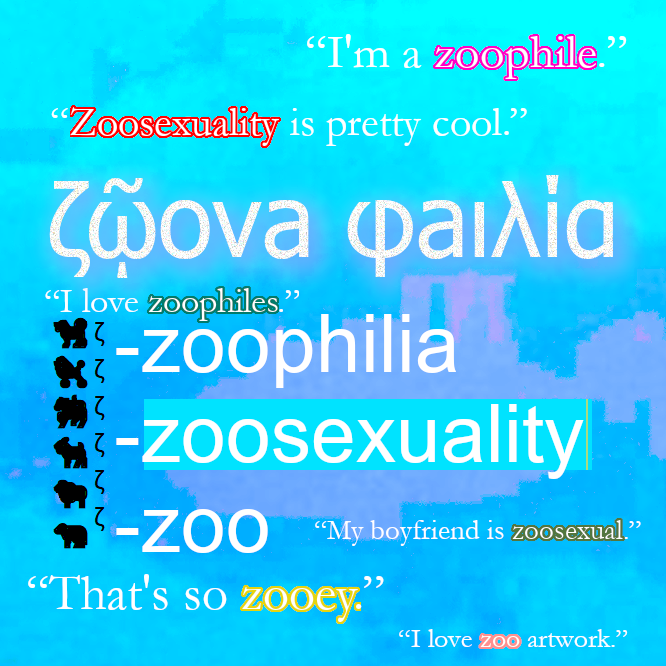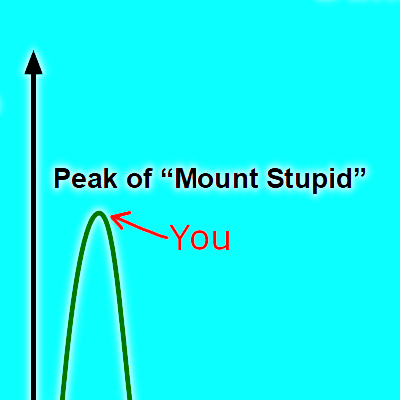Zoophile, zoosexual, or just plain zoo?

I don't know about anyone else, but I for one am a human who has habitually had sex with dogs because I think that dogs are sexy and they have been the sweetest romantic partners I've ever had and the ones who I've had sex with have been the ones who were more than happy to reciprocate my sexual desires towards them. I am conscious of the fact that dogs are the primary object of my sexual and romantic attractions. I would gladly self-define my own attractions as being most strongly pointed towards animals, and if someone were watching my entire life as a TV show, like in The Truman Show, then I think that that person in the audience would likely agree with me that animals are the center of my sexual and romantic orientation. I could see myself with a human, and it has happened before, but the idea of being with a human doesn't excite me. The idea of getting to spend time on a ranch with some horses, oh baby, now we're talking. Dogs, horses, cows, alpacas, you have my attention. I love the smell of dog breath in the bedroom.
Basically what I'm saying is that there is no ambiguity AT ALL in what my attraction is. It's animals. I am attracted to animals. So... what do we call me? Surely that can't be a difficult question, when the attraction is so clear, right? It must be obvious! Obviously, I am a... Zoosexual? Zoophile? Zoo?
Hey, why do we have so many different words to say the same thing in the animal-attracted community? Like, the main word for ourselves, the one that describes what we are - zoosexuals, zoophiles, and/or "zoos" - it kind of seems like we don't completely agree on what that word should be. On the one hand, these words all basically mean the same thing, they're all describing the same general idea: a zoosexual is someone who is attracted to animals, a zoophile is someone who is attracted to animals, and a zoo is someone who is attracted to animals. And yet, I have seen probably about a hundred arguments about which of these words we should be using for ourselves. Sometimes these arguments are very lighthearted, just talking about which word sounds the best, or which word might resonate more with outsiders to the community. Other people have very serious feelings on the topic, suggesting that some terms are passively hurtful and exclusionary, or even explicitly saying that some terms hold greater morality than other terms.
Yowza! Okay, so this question about what to call myself, which seemed like it should have been pretty easy, now seems like there might actually be a lot more to consider than an outsider would ever have guessed.
Well, I need something to put on my new business cards that describes my passion for animals, and I'd like to make sure that if a flaming bag of dog poop is left my front door two weeks from now, it's at least not from someone who would have been a friend if only I'd used a word that they liked more. So let's all take a deep breath. Pause... And take a step back to see how it came to this.
Recent History
If only we were all-knowing, we could perfectly trace the terms of animal attraction throughout history, back to the very first time a homo erectus said "wuh oom aaaaaagh!" while excitedly pointing at his friend who was down on all fours giving a wolf a homie handjob.
Alas, I just want to start at the 90s, because I think it would be fair to say that the 90s are more or less the earliest roots of where the "modern" animal attracted community came from. Furries, message boards, IRC, zines, oh baby the animal attracted scene in the 90s was bumpin. A lot of it was kind of an offshoot of the gay/kink communities of the time, some even an offshoot of the nerd communities at the time, but in many ways it also had legs of its own.
So. It's 1999, I am wearing my favorite jeans, and someone at this house party has just shouted into my ear over the blaring dulcet tones of What Is Love to ask if they heard right that has spun me right round before. I turn and cup a hand over their ear so that I can say back to them, Yeah, I'm a...
Zoophile!
Zoophile was the word back then. had put the word "zoosexual" together back then too, but it didn't catch on, at least as far as I'm aware of. If you were attracted to animals in the 90s, you were a zoophile. The general word for the attraction was zoophilia. If you were around trendy zoophiles, you probably also saw "zoo" used a fair amount too, as a standalone word for the orientation, as a word to include in things related to zoophilia. Calzoo, Z.O.O., I'm not sure that you would have heard anyone going around saying "Yeah I'm a zoo" or "Oh that's so zooey" but you might have seen "zoo [blank]" somewhere in the name of the chatroom you were joining, or "beast [blank]" or "be[a]stiality [blank]."
This is just anecdotal - a lot of our history is - but I swear I never saw "zoosexual" come into popular use until the mid 2010s, gaining favor in more socially sensitive times for being more in line with the successful terminology of homosexual or bisexual. And I only saw "zoo" come into popular use around 2020 on the heels of Zooier Than Thou's success: early on, that show chose "zoo" and "zooey" as their words for the orientation as a way of not having to weigh in on whether "zoophile" or "zoosexual" was the better term. because of the popularity of the Zooier Than Thou podcast within the online community, "zoo" just became the default word for a lot of people, even though to me I would almost say that "zoo" just started off as branding that was specific to the show.
As I sit here and write this in November of 2023, my impression of the community right now is that zoosexual is the most popular word. Zoo is a close second. And to be honest, I would say that zoophile is actually primarily used by haters these days, with most of the in-community use of "zoophile" being from older hangers-on to the term such as myself.
Okay, so there, we have our basic recent history down! Coming off of the 90s, zoophile/zoophilia was the word that most people would probably use. 2010s, zoosexual/zoosexuality begins to get usage as well, getting usage alongside the still popular zoophile/zoophilia. 2020s, zoosexual/zoosexuality and zoo/zooey are all the rage, and zoophile/zoophilia is used by gross old people who are being old and gross.
But now that we have the general roadmap, let's hit "zoom in" a few times, and see how bumpy this road has actually been.
Branding / Splintering / The Sapir-Whorf Hypothesis
Let's imagine that I have saved up a bunch of money, and I want to use it to start a business where I sell tacos out of a food truck. There's money to be made there if I play my cards right: a lot of successful brick-and-mortar restaurants begin as food trucks, because operating a food truck has a lower barrier to entry. I just have to win over the hearts and minds of the people with my amazing tacos, and create such a demand for my business that the line in front of my food truck never ends, and I'll be looking at getting a second truck in the next fiscal quarter.
With hope for a successful future beating in my heart, I go out to my taco truck that is going to be the start of it all, and I paint in big letters on the side of the truck, "Diarrhea Tacos." I put up posters on the sides of the truck like you might see in a doctor's office, showing the passages of the large and small intestines, and zoom-ins of bacteria and fecal matter.
Somehow, my taco truck does not do very well.
Maybe, just maybe, I should have thought about my branding a little more.
Branding is one of the debates at the heart of whether we should be called zoophiles or zoosexuals. The argument here is basically that public opinion of words like "homosexual" and "bisexual" is very positive, public opinion of words like "pedophilia" and "necrophilia" is very negative, we should want to associate ourselves more with positive things if we want public acceptance, let's call ourselves zoosexuals instead of zoophiles.
There might be something to that. I'm not completely convinced of the reasoning there personally, but I acknowledge the point that the argument is making. That suffix -phile is associated with descriptions of zoophilia as a mental defect, meanwhile homosexuals get to have cool parades, I see how someone wants to be more associated with the parades than the psychological diagnostics handbook. As a counter argument, I would offer 99.9999% of popular culture, where being the underdog with an attitude and a bit of an edge is seen as pretty cool, and saying things like "duuuude that kickflip was insane" is usually not uttered by someone who is insulting your kickflip. But, homophiles are called homosexuals now and things for them are currently going way better, so there is a precedent for saying the rebranding isn't a bad idea.
Another reason why some people may find an important distinction between zoophilia and zoosexuality is because, although the words can describe the same attraction, there are some things on the outskirts of each word that can accidentally be left out even just by changing the word only slightly.
For example, the word "zoosexuality" has the word "sex" right there in it, while the word "zoophilia" does not: someone who is romantically attracted to animals, but has no sexual attraction to anyone, may favor words like "zooromantic" and be agreeable to "zoophile," but for totally fair and obvious reasons feel like "zoosexual" excludes them from the group. Conversely, someone who is down to smell like hay but doesn't want to give the horse their real phone number may feel like "zooromantic" would be a totally silly and inaccurate word to describe them, "zoosexual" would be accurate, and "zoophile" would be fair enough. So when it comes to people who aren't as directly on the bullseye as I am with this animal attraction thing, a word that is more general like "zoophile" or "zoo" might be seen as the more inclusive way to go, even if it comes at the cost of being a word with worse branding for the modern public.
There is also an argument that certain words are used by abusers, and other words are used by animal attracted people who actually care about their animals.
For example, to me, the word "bestialist" is just a niche term that would mean "aromantic zoosexual," someone who would have sex with an animal but is not looking for any feelings attached; to me that is a neutral word, it doesn't imply that the person is abusive or non-abusive; there could be a totally cool bestialist over here, and a supremely fucked up bestialist over there. But I have seen other people who basically take "bestialist" as a word for "animal rapist," someone who will have sex with an animal no matter what the animal says. That word is kind of beside the point here, it's very rare that I ever see it used, but it goes to show how differently two people can take the same word.
Bringing it back to our main terms here, I have seen the argument that for the word zoophilia, because it is derived from "animal" and "love," it implies that zoophiles actually love animals, while zoosexuals might not, and all these new modern day zoosexuals are going to be the death of real zoophiles by including a bunch of aromantic sex-doing freaks in our communities. That seems... like an argument that can only come from someone who already has other baggage. It's ostensibly an argument about the words, buuuuut it doesn't feeeeel like it's actually an argument about the words anymore, you know? That seems like some weird conservative fist-shaking, hiding behind the paper-thin guise of it being about the words.
In linguistics, The Sapir-Whorf Hypothesis (which has other names too) is the idea that the words someone can use for something changes the way that they think about that thing. There are some ways in which that is true! If we surround ourselves with cynical influencers, and only learn how to talk about movies and games by saying they are poopy stupid crap, then you might find yourself having to describe a movie you actually did like in terms of the ways that it avoided being poopy stupid crap, and that's kind of missing the point of what it means to "like" something. But, you also didn't fully lose the fundamental experience of "liking" something, and you did find a way to express your enjoyment, even if it took extra steps.
I would argue, in the same way, that it does matter what words we use to define ourselves as animal attracted people, but the words also aren't the actual point, they are just one small part of . Someone doesn't hate animals just because they're a zoosexual instead of a zoophile. Someone doesn't hate progress just because they're a zoophile instead of a zoosexual. This is my personal opinion, but, to me, I do not see any validity to arguments on zoophile vs zoosexual vs zoo that actually imply some kind of moral superiority for one term or another. I think that's pretty goofy behavior, and is always a case of taking the argument too far.
With all of this said, it's no wonder why so many people just say "zoo." It's got almost everything going for it. It doesn't have any historical baggage of being associated with insanity or being associated with other publicly condemned groups. It's very general-purpose, in the sense that it doesn't imply any kind of attraction that is so specific that some animal-attracted people would feel left out. It doesn't imply poor moral values to most people, unless it's someone who already has a bee in their bonnet about animal attraction, but then any term was probably going to set them off. I think if I want a word for my business card that is least likely to result in someone leaving a flaming bag of dog poop on my doorstep, zoo is the ticket. The only drawbacks I would say it really has are that it can sound a little childish, like, "zooey" is not something you imagine a serious guy talking about serious stuff saying, and it can also be unclear to outsiders that you're actually talking about an orientation here, so for both of those reasons if I was giving a talk on animal attraction, I would probably pick one of the other words unless I was ready to dedicate a little opening segment of the talk to explaining the kinds of things that zoos find zooey.
For me, there are values in all three of our main words here - zoophile, zoosexual, and zoo. But these values aren't moral. Sometimes the word choice that I use is about inclusion. Sometimes it's about professionalism and branding. Sometimes one of the words just has a better ring to it when used in a certain sentence.
To anyone reading who is animal attracted, I would encourage you to call yourself whatever word makes you happy, and not judge others for the word that they choose to use. It's really as easy that.
But, in the pursuit of understanding our zoophilic zoosexual zooey zetalicious landscape, let's also summarize what we've covered.
Zoophile
-Has the most historical prestige
-Has roots in animal attraction as a mental defect
-Derived from the roots "Animal Love"
-Mixed branding
-Clear meaning
Zoosexual
-More modern term
-Sounds professional and neutral
-Falls in line with more popular LGBTQ terminology
-Clear meaning
-May exclude folks such as asexual zooromantics
Zoo
-Shorthand term
-Most inclusive of animal attracted orientation terms
-May be unclear without sufficient context
-May sound diminutive
-Does rhyme with "awoo"
Article written by Alissa Dogchurch (November 2023)
Questions, comments on concerns? Check out our Discord server! discord.gg/EfVTPh45RE


